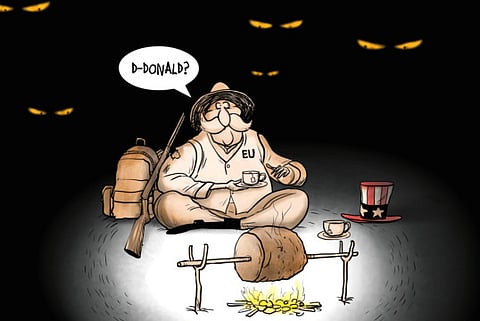Europe needs a Plan B to face new US approach
EU should strengthen military readiness and decision-making while addressing some of Trump’s justified concerns

The past two weeks have been tough for Atlanticists in Europe who still think we shouldn’t give up on the United States. US President Donald Trump almost wrecked a Nato summit, he offended his hosts in Britain, and he called the European Union a “foe” of the US, all while cosying up to President Vladimir Putin of Russia, a “good competitor.”
For months, Europeans concerned about the president’s statements have been reassured by American friends: Ignore the tweets, focus on what the administration does, and trust our checks and balances. That made some sense. Senior Cabinet members like the secretary of defence have remained committed to the liberal international order and to America’s alliances and partnerships. Congress has strongly supported Nato. And US troops still guarantee Europe’s security.
But in international relations, it’s not only deeds that matter; words also do, especially the US president’s.
Let’s face it: Trump’s core beliefs conflict with the foundations of Western grand strategy since the mid-1940s. He believes the US is getting a bad deal from its European allies. He expresses admiration for autocrats like Putin and the leader of North Korea, Kim Jong-un, while reserving his most acidic comments for democratic partners like Germany’s Angela Merkel and Canada’s Justin Trudeau. He represents the opposite of liberal internationalism.
That sends Europe a sad message: The era of the US’ benign hegemony may be over, with Europe extremely ill-prepared.
On July 11 and 12, Trump undercut a Nato summit that was yielding results: reaffirming a goal for members to strengthen the alliance by spending 2 per cent of their gross domestic product on the military by 2024. While European military spending has been rising for some time, Trump was correct in saying that some members, including Germany, aren’t doing enough. He also has legitimate concerns about trade imbalances.
Still, his mischaracterisation of the goal as “dues” owed to the US makes it harder for European leaders to ask their voters for increased military spending. And his bullying comments led Europeans to suspect he might be more interested in leaving the alliance than in leading it.
Such implied threats attack the foundation of the alliance: the idea of solidarity and commitment to one another’s security. Americans tell us Trump can’t leave Nato without Senate consent — a debatable notion that misses the point. Any doubt about the US’ commitment hurts the credibility of Nato’s deterrence.
That is what makes Trump’s statements so dangerous. They may extract a few billion dollars for defence spending, but they destroy the assurances that those dollars — or euros — are meant to bolster.
Concerns ignored
Those uncertainties were magnified by the president’s bizarre appearance with Putin in Helsinki. Trump in effect disavowed his own intelligence community. He failed to declare Russian meddling in Western democracies unacceptable. If Putin does not feel emboldened now, when will he? Who will now believe that interfering in democratic elections comes at a price? Trump’s performance seemed to indicate that the US is ready to give up its ambition to be the free world’s respected leader.
That was painful for America’s European friends and allies to watch. Throughout the Trump presidency, we have tried to preserve a close partnership with the US, influence the Trump administration and safeguard European interests. It hasn’t worked. Trump ignored our concerns by leaving the Paris climate pact and the Iran nuclear deal, and he slapped tariffs on his closest allies.
Why, then, should Europeans consider this administration a trustworthy partner? A recent ZDF Politbarometer poll found that only 9 per cent of Germans do.
But there is no realistic Plan B yet, posing a conundrum: Europeans cannot simply go it alone, but we must prepare to be left alone. So we must develop a Plan B. Duck and cover will not suffice. First, Europe needs a dual-track approach. We should strengthen our military readiness and decision-making capacity while showing the White House more clearly that its actions have costs for the US. We also must address some of Trump’s justified concerns, such as increasing military spending — but in our own interest, rather than to please him.
We should also offer to work closely with those Americans who believe that a strong partnership with Europe remains in the United States’ best interest. Europeans need to engage, engage, engage: with Congress, with governors, with America’s business community and civil society.
But can we rely on the US system of government to work as promised? Now is the time to check and balance! At the risk of “meddling”: Are there Republican senators willing to refuse to vote for any Trump appointee unless he stops denigrating his own intelligence community?
Security should not be an issue that pits the US against Europe. Many Western societies are divided between those who believe in preserving the post-Second World War order and those who would replace it with 19th-century nationalism.
Europeans who believe that abandoning the Western liberal order would be an extraordinary act of stupidity must step up our game. But we won’t succeed without strong support from like-minded friends across the Atlantic. US patriots, will you work with us?
— New York Times News Service
Wolfgang Ischinger has been chairman of the Munich Security Conference since 2008, and teaches at the Hertie School of Governance in Berlin.


